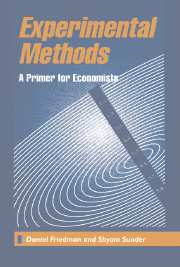Book contents
- Frontmatter
- Contents
- List of figures and tables
- Preface
- Acknowledgments
- EXPERIMENTAL METHODS
- 1 Introduction
- 2 Principles of economics experiments
- 3 Experimental design
- 4 Human Subjects
- 5 Laboratory facilities
- 6 Conducting an experiment
- 7 Data analysis
- 8 Reporting your results
- 9 The emergence of experimental economics
- Appendixes: Supplemental materials
- Glossary
- References
- Index
4 - Human Subjects
Published online by Cambridge University Press: 05 June 2012
- Frontmatter
- Contents
- List of figures and tables
- Preface
- Acknowledgments
- EXPERIMENTAL METHODS
- 1 Introduction
- 2 Principles of economics experiments
- 3 Experimental design
- 4 Human Subjects
- 5 Laboratory facilities
- 6 Conducting an experiment
- 7 Data analysis
- 8 Reporting your results
- 9 The emergence of experimental economics
- Appendixes: Supplemental materials
- Glossary
- References
- Index
Summary
What makes experiments so different from other methods economists use is the presence of human subjects. This is why doing experiments changes the way you think about economics. Rewarding data and insights arise when human behavior helps cast new light into one of the many corridors of economics that have remained unlit by other methods. Long ago Adam Smith inferred the existence of an “invisible hand” from its consequences. In the laboratory we can observe how real untutored humans are able to operate that hand in specific circumstances. Economic theory has largely bypassed questions about how humans observe, learn, memorize, form expectations, adapt, formulate, and choose strategies and decisions, by making convenient assumptions and leaving the actual discovery of answers to other social scientists. However, answers to these questions about human behavior are crucial to many core areas of economics, including industrial organization, securities markets, and monetary theory. Experimental economists do not seek to answer such questions directly. They do seek, through direct observation of human behavior in appropriately designed economic experiments, to evaluate the ability of competing theories to organize the data, and they provide the data to theoreticians for their use in pushing the theory further.
On the other hand, laboratory experimentation in economics presents a unique set of problems. The most difficult of these problems arise from observing and dealing with real human beings. In conducting experiments, the homogenous abstract agents of economic models and traders/consumers of computerized databases are replaced by flesh-and-blood people with all their infinite diversity, idiosyncracies, moods, unexpected activity, and free will.
- Type
- Chapter
- Information
- Experimental MethodsA Primer for Economists, pp. 38 - 60Publisher: Cambridge University PressPrint publication year: 1994



